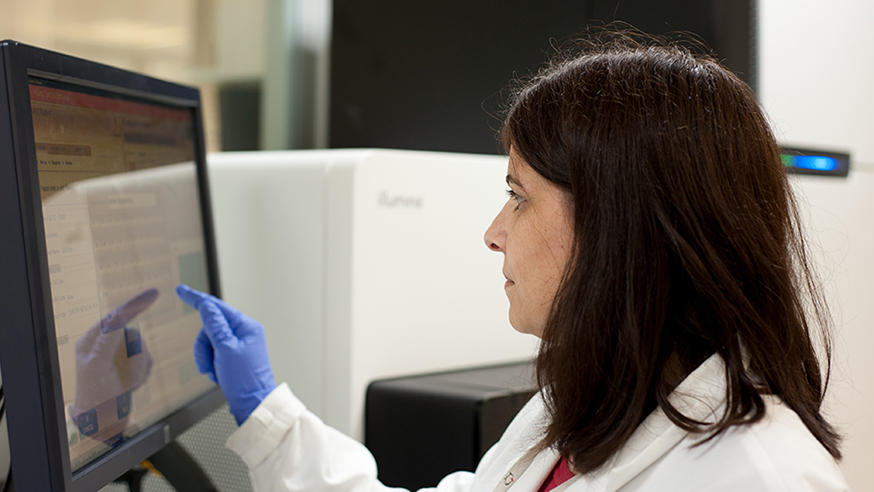
Genetic sequencing (photo: Jan Chlebik)
A thousand breast and ovarian cancer patients have now benefited from a faster BRCA gene testing process that was developed in the UK and is being adopted around the globe.
The 1,000th cancer patient has had ‘mainstream’ gene testing through an innovative process that offers affordable gene testing to cancer patients at their cancer clinic appointment.
The new approach was developed by researchers at The Institute of Cancer Research, London, through the Mainstreaming Cancer Genetics (MCG) programme, funded by Wellcome.
Cancer patients could previously only access gene testing if referred to a genetics clinic. Referral criteria were complex and waiting lists for genetic appointments were long – many cancer patients did not get testing, even if they were eligible for it.
Patient-centred testing
The ICR and The Royal Marsden NHS Foundation Trust began an innovative pilot in 2013 to provide faster, more efficient and more patient-centred testing through routine cancer clinic appointments.
The pilot was quickly successful, and in 2014 mainstream gene testing of the BRCA1 and BRCA2 genes in eligible cancer patients became routine NHS care at The Royal Marsden.
In just the two years since, 1,000 cancer patients have had gene testing using the new process.
Professor Nazneen Rahman, Head of Cancer Genetics at the ICR and The Royal Marsden, said: “There were two main problems with the traditional system for gene testing. Firstly, gene itself testing was slow and expensive, and secondly the process for accessing gene testing was slow and complex.
“We used new DNA sequencing technology to make a fast, accurate, affordable cancer gene test, which is now used across the UK. We then simplified test eligibility and brought testing to patients in the cancer clinic, rather than making them have another appointment, often in another hospital.”
These two innovations have greatly increased the number of patients that can benefit from testing, without increasing costs.
Video courtesy of MCG Programme
Faster results
The Royal Marsden now offers tests to three times as many patients a year as it used to. The new pathway is also much faster, with test results received within four weeks compared with 20 weeks in the old system.
The gene test result helps patients to get the best management for their cancer.
Miss Fiona MacNeill, Consultant Surgeon at The Royal Marsden and President of the Association of Breast Surgery, said: “Having the BRCA test result is very helpful when discussing the surgical options with breast cancer patients. Some women with a BRCA mutation choose to have bilateral mastectomy because their risk of getting a new cancer in either breast is increased. It has been great to be able to quickly and directly arrange for testing at the cancer clinic.”
The results also provide information about whether hereditary causes of cancer are relevant for a patient’s family members. All women found to have a BRCA mutation have an appointment with the genetics team who coordinate providing information to relatives.
Many relatives choose to have a test to see if they have inherited the mutation. This allows them to make more informed choices and gives opportunities to reduce cancers in women found to be at high risk.
A cost-effective system
The patient response has been overwhelmingly positive with more than 95% of cancer patients wanting testing.
Professor Rahman added: “The main reason we wanted to change the system was because patients were telling us that they wanted to have better access to gene testing. We are delighted patients have found it so helpful and that it is more cost-effective for our cash-strapped NHS”.
“Many other centres across the country and internationally are adopting mainstream gene testing. This will help many women with cancer and will prevent cancers in their relatives.”
Read more about the MCG Programme